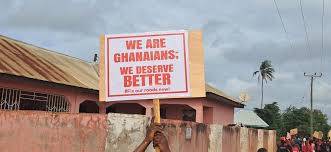Bad Roads in Ghana: Do We Deserve Better?
Ghana, a country rich in culture and resources, has long struggled with the quality of its road infrastructure. Despite being one of the fastest-growing economies in West Africa, the state of roads remains a pressing issue. With increasing tax revenues and a growing population, many citizens are left wondering: don’t we deserve proper roads after all the taxes we pay?
The Current State of Roads
The quality of roads in Ghana varies widely. While major cities like Accra and Kumasi have seen some improvements, many rural areas remain underserved. The road network, essential for trade, transportation, and accessibility, is often riddled with potholes, poorly constructed surfaces, and inadequate maintenance. This neglect not only hinders economic activities but also poses risks to safety, leading to accidents and fatalities.
In rural areas, the situation is even more dire. Poor road conditions can cut off communities from essential services like healthcare and education. Farmers struggle to transport their goods to markets, impacting their income and livelihoods. As a result, economic opportunities are stunted, contributing to persistent poverty in these regions.
The Financial Context
Ghanaian citizens contribute significantly to the national treasury through various taxes, including income tax, Value Added Tax (VAT), and road tolls. Yet, despite this financial input, the returns in terms of infrastructure development remain disappointingly low. The lack of transparency and accountability in how tax revenues are allocated raises concerns among citizens. Many question where their money is going and why such a vital aspect of public infrastructure is often neglected.
The government has announced numerous road construction projects and initiatives over the years, but progress is slow and often hampered by bureaucratic inefficiencies, corruption, and inadequate funding. This leads to a frustrating cycle where promises are made, but tangible improvements are seldom seen.
The Impact on Daily Life
The repercussions of bad roads are felt daily by Ghanaians. Commuters experience long delays, and public transport services struggle to operate efficiently. Businesses face increased transportation costs, which can be passed on to consumers. The tourism sector, vital for Ghana's economy, is also affected, as poor road conditions deter potential visitors.
Moreover, during the rainy season, many roads become impassable, isolating communities and making it difficult for emergency services to respond. This not only endangers lives but also exacerbates the socioeconomic divide between urban and rural areas.
The Way Forward
Addressing the issue of bad roads in Ghana requires a multifaceted approach. First, there needs to be a commitment from the government to prioritize infrastructure development as part of a broader economic strategy. This involves not only allocating adequate funding but also ensuring that projects are executed transparently and efficiently.
Community involvement is also essential. Local stakeholders should be engaged in planning and monitoring road projects to ensure that the roads meet the specific needs of the communities they serve. Additionally, leveraging technology and innovation can help in the design and maintenance of roads, making the process more cost-effective and sustainable.
Public-private partnerships could also play a crucial role in addressing infrastructure deficits. By collaborating with private entities, the government can tap into additional resources and expertise, leading to better road construction and maintenance practices.
Conclusion
The issue of bad roads in Ghana is a complex problem that affects every citizen. With the taxes we pay, we deserve better infrastructure that fosters economic growth, improves safety, and enhances quality of life. By prioritizing road development, ensuring accountability, and involving local communities, Ghana can take significant strides toward a more connected and prosperous future. The time for change is now, and the citizens of Ghana should not settle for anything less than the roads they deserve.




No comments yet
Be the first to share your thoughts!